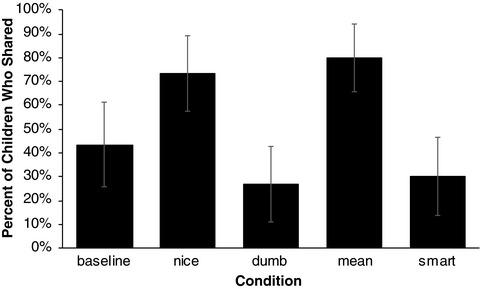Our official English website, www.x-mol.net, welcomes your
feedback! (Note: you will need to create a separate account there.)
Overheard conversations can influence children’s generosity
Developmental Science ( IF 3.1 ) Pub Date : 2020-12-02 , DOI: 10.1111/desc.13068 Wen Qin 1 , Li Zhao 1, 2 , Brian J Compton 3 , Yi Zheng 1 , Haiying Mao 1 , Jiaxin Zheng 1 , Gail D Heyman 3
Developmental Science ( IF 3.1 ) Pub Date : 2020-12-02 , DOI: 10.1111/desc.13068 Wen Qin 1 , Li Zhao 1, 2 , Brian J Compton 3 , Yi Zheng 1 , Haiying Mao 1 , Jiaxin Zheng 1 , Gail D Heyman 3
Affiliation

|
Understanding the factors that promote the development of generosity has both theoretical and practical importance. This study examines one potential influence: overheard conversations that contain evaluative statements about the behavior of others that were described as widely shared opinions. In Study 1 (N = 120), younger (mean age 4.1 years old) and older (mean age 5.9 years old) participants overheard two adults discuss a target child's act of generosity, and in a between-subjects manipulation, the conversation included either praise for the target child, or criticism. Participants in the older group were more likely to behave generously on a distribution task if the overheard conversation involved praise rather than criticism, but the participants in the younger group showed no such effect. Study 2 (N = 150) and Study 3 (N = 60) were preregistered follow-up studies that included older children only (a 5-year-old group). Study 2 showed that children were again more likely to share after overhearing a conversation in which an individual who behaved generously was described in favorable terms, and the same effect was seen when the overheard conversation involved criticism of an individual who did not share. The procedure of Study 3 matched that of Study 1, except the distributions were made in private, and the overheard conversation effect was seen once again. These findings suggest that by age 5, children can use information they hear about individuals who are not present to guide their own behavior, and that overheard evaluative comments can promote generosity.
中文翻译:

无意中听到的谈话会影响孩子的慷慨
了解促进慷慨发展的因素具有理论和实践意义。这项研究考察了一种潜在的影响:无意中听到的对话中包含对他人行为的评价性陈述,这些陈述被描述为广泛共享的观点。在研究 1 ( N = 120) 中,年轻(平均年龄 4.1 岁)和年长(平均年龄 5.9 岁)的参与者无意中听到两个成年人讨论目标儿童的慷慨行为,并且在受试者之间的操纵中,对话包括对目标孩子的表扬或批评。如果无意中听到的谈话涉及赞美而不是批评,年长组的参与者更有可能在分配任务上表现得慷慨,但年轻组的参与者没有表现出这种效果。研究 2 (N = 150) 和研究 3 ( N = 60) 是预先注册的随访研究,仅包括年龄较大的儿童(5 岁组)。研究 2 表明,在无意中听到对行为慷慨的人用好话描述的谈话后,孩子们再次更有可能分享,当无意中听到的谈话涉及对不分享的人的批评时,也会看到同样的效果。研究 3 的过程与研究 1 的过程相同,只是分发是私下进行的,并且再次看到了偷听的谈话效果。这些发现表明,到 5 岁时,孩子们可以使用他们听到的关于不在场的人的信息来指导他们自己的行为,而无意中听到的评价性评论可以促进慷慨。
更新日期:2020-12-02
中文翻译:

无意中听到的谈话会影响孩子的慷慨
了解促进慷慨发展的因素具有理论和实践意义。这项研究考察了一种潜在的影响:无意中听到的对话中包含对他人行为的评价性陈述,这些陈述被描述为广泛共享的观点。在研究 1 ( N = 120) 中,年轻(平均年龄 4.1 岁)和年长(平均年龄 5.9 岁)的参与者无意中听到两个成年人讨论目标儿童的慷慨行为,并且在受试者之间的操纵中,对话包括对目标孩子的表扬或批评。如果无意中听到的谈话涉及赞美而不是批评,年长组的参与者更有可能在分配任务上表现得慷慨,但年轻组的参与者没有表现出这种效果。研究 2 (N = 150) 和研究 3 ( N = 60) 是预先注册的随访研究,仅包括年龄较大的儿童(5 岁组)。研究 2 表明,在无意中听到对行为慷慨的人用好话描述的谈话后,孩子们再次更有可能分享,当无意中听到的谈话涉及对不分享的人的批评时,也会看到同样的效果。研究 3 的过程与研究 1 的过程相同,只是分发是私下进行的,并且再次看到了偷听的谈话效果。这些发现表明,到 5 岁时,孩子们可以使用他们听到的关于不在场的人的信息来指导他们自己的行为,而无意中听到的评价性评论可以促进慷慨。











































 京公网安备 11010802027423号
京公网安备 11010802027423号